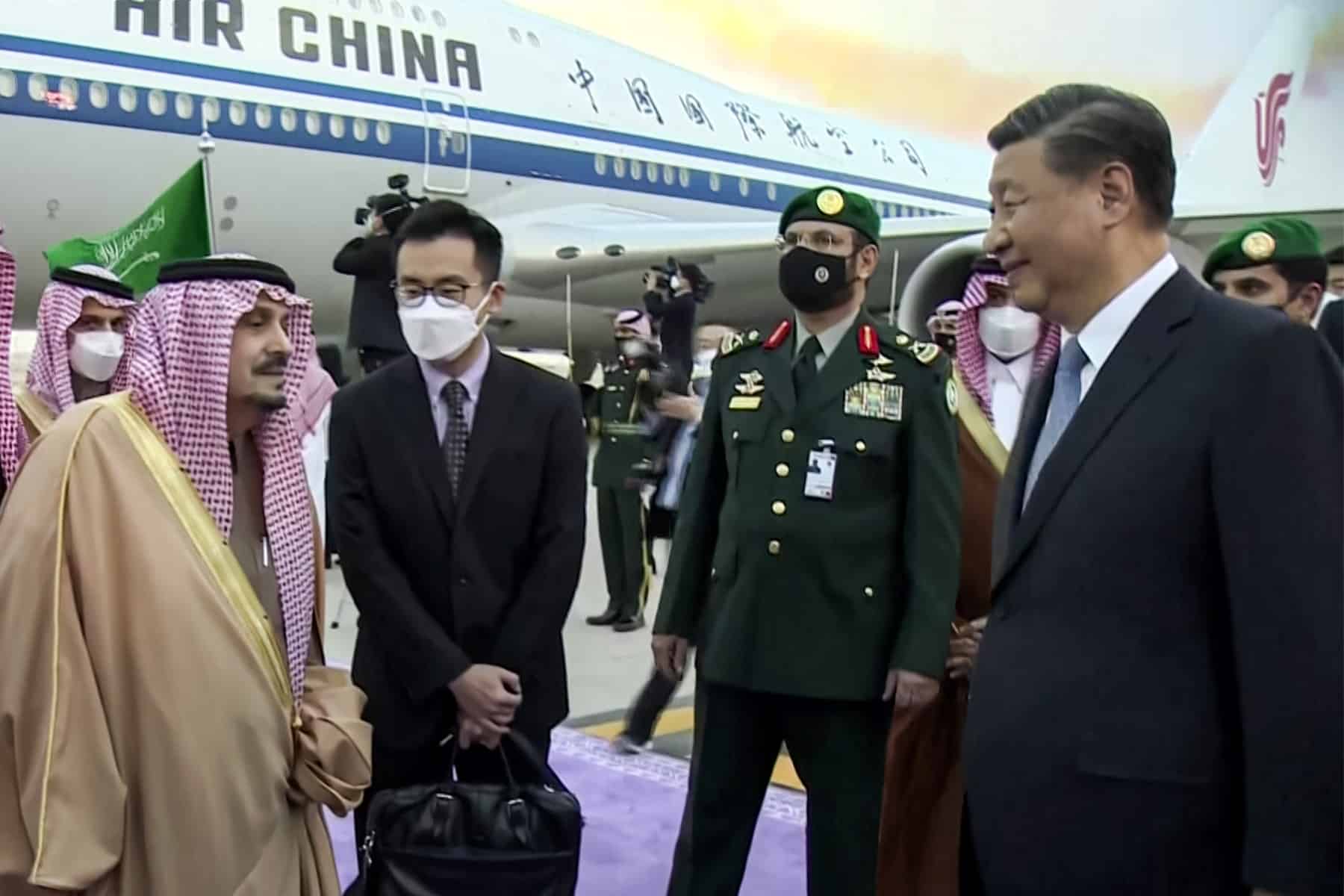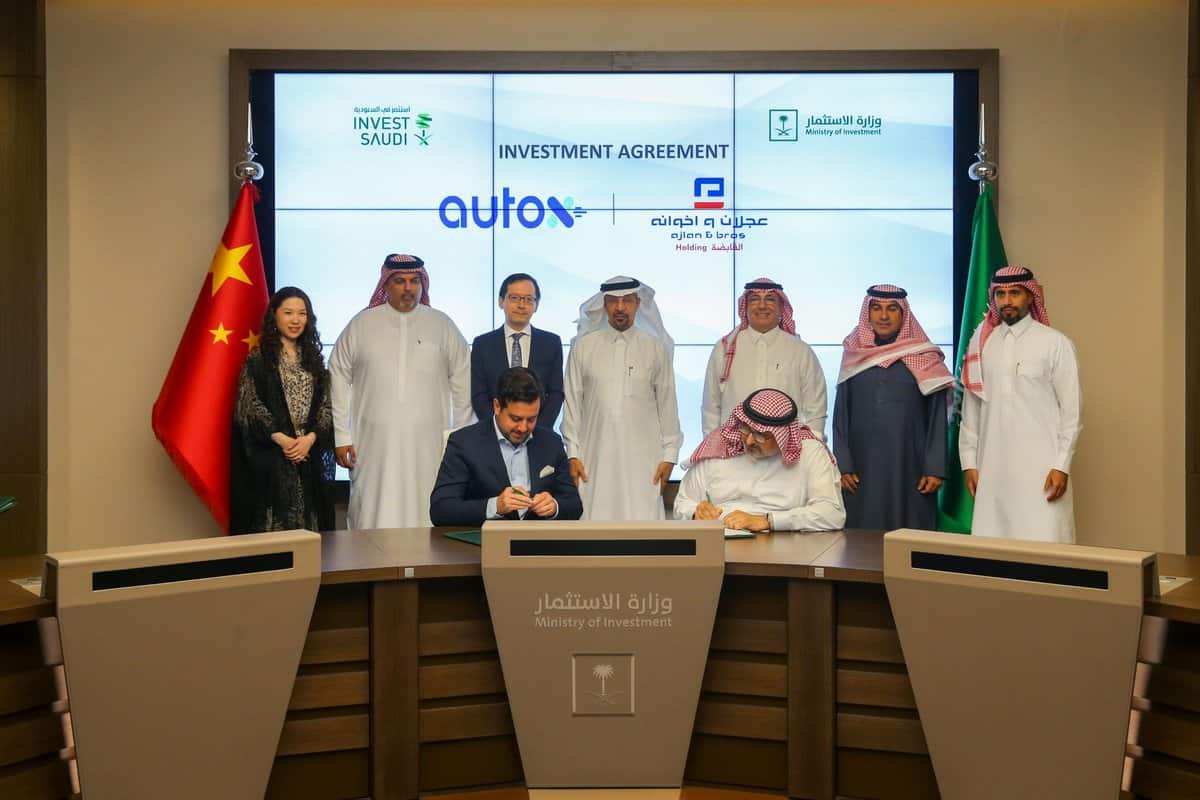RIYADH, Saudi Arabia — Saudi and Chinese companies have signed 34 investment agreements, within the framework of the visit of the Chinese President Xi Jinping to the Kingdom.
The agreements were signed in the presence of Saudi Minister of Investment Eng Khalid bin Abdulaziz Al-Falih, and representatives of government agencies related to the sectors in which the agreements were signed.
The agreements between the two sides covered several sectors in the fields of green energy, green hydrogen, photovoltaic energy, information technology, cloud services, transportation, logistics, medical industries, housing and construction factories.
Chinese President Xi Jinping touched down in Saudi Arabia on Wednesday for a visit that is likely to focus on energy ties as Washington warned of Beijing’s growing influence.
Xi, recently reanointed as leader of the world’s second biggest economy, arrived in Riyadh, Chinese and Saudi state media said, for a three-day visit that will include talks with Saudi and other Arab leaders.
Saudi Foreign Minister Prince Faisal bin Farhan and Riyadh Governor Prince Faisal bin Bandar were among those who welcomed Xi at the airport, where a ceremonial purple carpet was laid out for his arrival.
China is Saudi Arabia’s top oil customer, and both sides appear keen to expand their relationship at a time of economic turmoil and geopolitical realignment.

The trip — only Xi’s third overseas since the coronavirus pandemic began, and his first to the world’s top oil exporter since 2016 — comes after US President Joe Biden’s visit in July, when he pleaded in vain for higher oil production.
It will feature bilateral meetings with Saudi King Salman and Crown Prince and Prime Minister Mohammed bin Salman as well as a summit with the six-member Gulf Cooperation Council and a wider China-Arab summit.
Asked about the visit, White House National Security Council spokesman John Kirby told reporters on Wednesday that Saudi Arabia remains a crucial US ally, but warned of “the influence that China is trying to grow around the world”.
“We believe that many of the things they’re trying to pursue and the manner in which they’re trying to pursue it are not conducive to preserving the international rules based order,” Kirby said, adding that Washington did not expect nations to choose between the two powers.
Saudi Energy Minister Prince Abdulaziz bin Salman on Wednesday said that “Saudi Arabia will remain China’s credible and reliable partner” in the global oil market.
Also Read Xi Jinping reaches Saudi as China seeks energy cooperation
Bilateral “relations… are witnessing a qualitative leap,” the official Saudi Press Agency (SPA) quoted him as saying.
He said the two countries will endeavour to boost cooperation in energy supply chains by establishing a “regional centre” in Saudi Arabia for Chinese factories, according to SPA.
The agency said the kingdom accounted for more than 20 percent of Chinese investment in the Arab world between 2005 and 2020, the largest share of any nation in the region.
Oil markets are key to the bilateral talks, especially given the substantial market turbulence seen since Russia invaded Ukraine in February.
The G7 and European Union on Friday agreed to a $60-per-barrel price cap on Russian oil in an attempt to deny the Kremlin war resources, injecting further market uncertainty.
#China and #SaudiArabia have close relationship of friendship and partnership, and strategic mutual trust is constantly consolidated between the two, says President #XiJinping upon his arrival in Riyadh. @KSAmofaEN @KingSalman @MFA_China pic.twitter.com/ydcAl3i6Pv
— TRENDS (@mena_trends) December 8, 2022
On Sunday, the OPEC+ oil cartel led jointly by Saudi Arabia and Russia opted to keep in place production cuts of two million barrels per day approved in October.
Washington said those cuts amounted to “aligning with Russia” on the war in Ukraine.
The US has been engaged in what is often described as an oil-for-security partnership with Saudi Arabia since the tail-end of World War II.
While the Biden administration has smarted over the production cuts, Riyadh has at times accused the US of failing to hold up the security end of the bargain, notably after strikes in September 2019 claimed by Yemen’s Huthi rebels temporarily halved the kingdom’s crude output.
Deals in pipeline
Saudi and Chinese officials have provided scant information about the agenda of the bilateral talks, although Ali Shihabi, a Saudi analyst close to the government, said he expected “a number of agreements to be signed”.
Chinese foreign ministry spokeswoman Mao Ning said on Wednesday that Xi’s programme represents the “largest-scale diplomatic activity between China and the Arab world” since the People’s Republic of China was founded.
Also Read Chinese flags flutter in Saudi capital as Xi visits kingdom for first time since 2016
Analysts say potential deals seeing Chinese firms become more deeply involved in mega-projects central to the Saudi Crown Prince’s vision of economic diversification will likely be key talking points.
Key Saudi projects include the futuristic $500 billion megacity NEOM, a so-called cognitive city that will depend heavily on facial recognition and surveillance technology.
In a boost to the kingdom’s ability to fund its diversification plans, the finance ministry on Wednesday announced a preliminary budget surplus for 2022 of some $27 billion, its first surplus in nearly a decade.
First China-Arab Summit
China’s President Xi Jinping expressed his pleasure to visit the Kingdom of Saudi Arabia again after six years, and to attend the first China-Arab Summit, and the first China-Gulf Cooperation Council (GCC) Summit
He was invited by the Custodian of the Two Holy Mosques King Salman bin Abdulaziz Al Saud.
Upon his arrival at King Khalid International Airport in Riyadh, Jinping said in statements that “China and the Kingdom of Saudi Arabia have a close relationship of friendship, partnership and fraternity, over the past 32 years since the establishment of diplomatic relations between them.
“The two sides have continued to exchange understanding and support, and the strategic mutual trust between them is constantly consolidated. The practical cooperation between them has achieved fruitful outcomes in all fields. The two sides maintain close communication and coordination with regard to international and regional affairs.”
His Excellency pointed out that during the visit, he will discuss in depth with the Custodian of the Two Holy Mosques and Crown Prince the bilateral relations as well as international and regional issues of common interest, and working together to plan the development of Chinese-Saudi relations.
“I look forward to attending the first China-Arab Summit and the first China-Gulf Cooperation Council (GCC) Summit, to work with the leaders of the Arab countries and the Gulf Cooperation Council (GCC) countries to advance the Chinese-Arab relations and Chinese-GCC relations to a new level”, the President concluded.
Trade relations
Saudi Minister of Economy and Planning Faisal bin Fadel Al-Ibrahim also affirmed the strength and depth of the relations that bind Saudi Arabia and China, as they included strong strategic partnerships between the two sides in several fields, covering the economy, various fields of energy, security, transportation, infrastructure and investment.
He said that the relations between the two countries embody a common strategic vision in the political, economic, trade, cultural, humanitarian, military, security and various energy fields at the regional and international levels, based on cooperation and mutual respect to serve the higher interests of the two friendly countries.
Al-Ibrahim also stressed the depth of trade relations between the two countries, as China is the world’s largest importer of crude oil and a strategic partner, topping the list of the Kingdom’s trading partners in the field of commodity trade.
The total exports from the Kingdom to China amounted to about SAR65.5 billion in the third quarter of 2022, while the Kingdom’s exports to China increased by 29.4 percent compared to the same period in 2021.
The total value of imports to the Kingdom from China amounted to 37.4 billion Saudi riyals in the third quarter of 2022, and imports to the Kingdom from China increased by 22.9 percent compared to the same period from 2021.
The volume of trade exchange between the two countries amounted to SAR 304 billion in 2021, and trade exchange in the third quarter of 2022 recorded SAR 103 billion.

